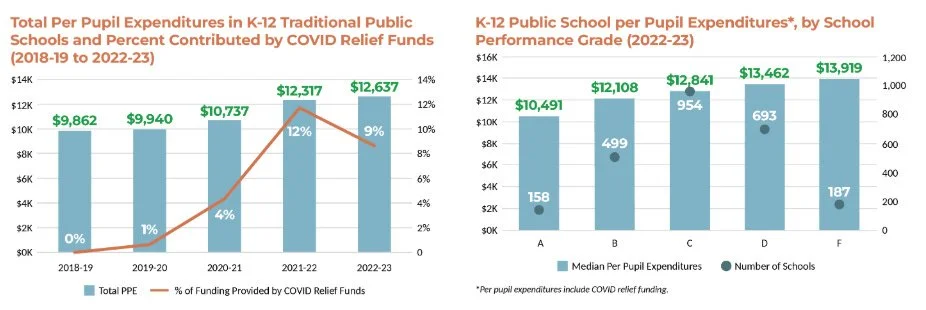ANALYSIS: Senate Republican Budget Highlights Multipronged Strategy to Education Policy
Democrats continue to push system with roots in the 1700s…
Raleigh N.C.— Last week, the North Carolina Senate approved the Republican proposed budget in a bipartisan 30-15 vote. This marks the first major step in the budget process as the General Assembly works to craft a final spending plan for the 2025-2027 biennium.
While the details of the budget are often important for various interest groups, I want to take the opportunity with this piece to highlight Republicans’ multipronged approach to education in contrast to Democrats’ focus on traditional neighborhood schools, which dates back at least to the Northwest Ordinance of 1787.
Breaking down the critique
North Carolina Democrats typically criticize Republicans for not spending enough on education. As if simply spending money was the key to better education outcomes. However, that is not what the data shows.
Data from research nonprofit Best NC shows that per-pupil expenditures have increased in North Carolina, and that higher levels of funding do not translate into better student performance.
What Republicans are actually doing
Rather than simply continue to fund legacy programs, Republicans in the General Assembly laid out numerous strategies to improve public education. Let’s take a lookat the ones included in the proposed budget.
·Increase teacher pay by 2.3% in FY 2025-26 with an average increase of 3.3% over the biennium, with an additional $3,000 bonus over two years. Over the two-year biennium, average teacher compensation would increase to 8.9%, bringing average teacher pay up to an estimated average pay of $62,407.
In addition to the general pay raises, the Senate budget proposed supplements for teachers who promote advanced classes.
The budget funded a supplement of up to $10,000 for teachers whose district partners with the Advanced Teaching Roles program.
The Senate budget enhances the already successful state reading plan. The budget broadens the tracking program and expands the number of students with individual reading plans. This legislation works to include parents as part of the solution.
Additionally, the budget improves the ApprenticeshipNC program at Community Colleges by promoting mentorship.
The budget spends $36.5 million to fund the NC Propel program that promotes career pathways to healthcare, engineering, advanced manufacturing, transportation, and information technology.
Last year, Republicans provided additional funding to clear the waitlist and expand access to the North Carolina Opportunity Scholarship Program, allowingevery family in North Carolina to access a school of their choice.
Tim’s Take: The Republican budget not only increases teacher pay; it incentivizes advance learning. And it focuses on policies that improve student outcomes rather than simply spending more money on consultants. While good faith disagreements are possible, the Democrats’ talking points about education funding simply ignore the strong policy proposal put forward by the General Assembly.

